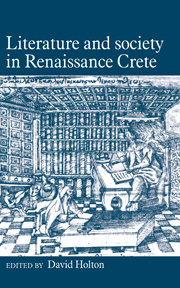Book contents
5 - Comedy
Published online by Cambridge University Press: 14 October 2009
Summary
One of the achievements of Cretan writers in the Venetian period was the creation of urban comedies in Modern Greek. Three works survive: Katzourbos (or Katzarapos) by Georgios Chortatsis, the anonymous Stathis and Fortounatos by Markos Antonios Foskolos. The first two date from the late sixteenth or early seventeenth century, while Fortounatos was composed during the Siege of Kastro, around 1655. All three were apparently intended for stage production (Puchner 1983d).
The aims of this chapter are to provide a general introduction to the Cretan comedies, to discuss briefly their relation to literary antecedents (and in particular to Italian comedy), and finally to explore parallels between their dramatic ‘world’ and the ‘realities’ of Cretan society as illustrated (but how faithfully or completely?) in historical documents.
The three surviving plays do not give the full story of comedy in Venetian Crete. Writing at the end of the seventeenth century, Giovanni Papadopoli mentions that Greek comedies were regularly performed during Carnival, at least until the Siege of Kastro. Parts of a lost play may in fact have survived as passages of verse embedded in the folk-tale of the Forgotten Bride.
At Carnival Cretans could witness a kind of ‘street theatre’. Papadopoli (fo. 127r–v) describes how men would parade the streets masked and dressed like the Flemish sailors from the wine-merchants' ships, gabbling in imitation Dutch, with particularly amusing results when they came across the ‘victims’ of their masquerade.
- Type
- Chapter
- Information
- Literature and Society in Renaissance Crete , pp. 103 - 128Publisher: Cambridge University PressPrint publication year: 1991
- 7
- Cited by



